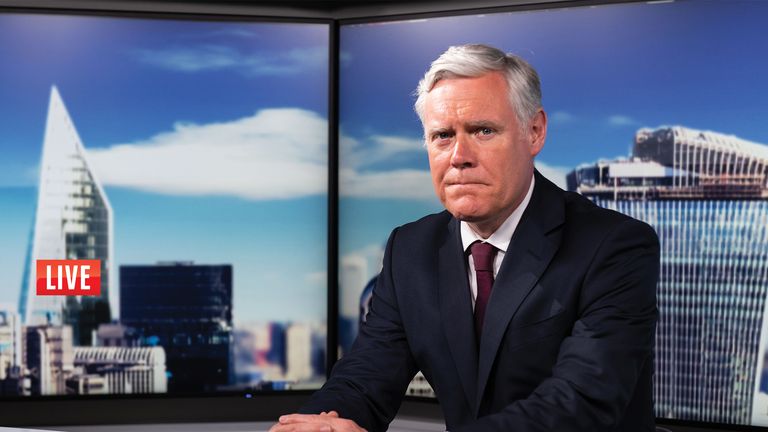France has capped energy price rises at 4% – could UK do the same?
In January the French government forced state-owned energy provider EDF to cap price rises at 4% for a year – could the same be done in the UK and does it mean the French are better off?The measure has cost €8.4bn (£7bn) and will protect the majority of households from the huge energy bills hikes seen here in the UK.
Business presenter Ian King was asked about this in a Q&A in our cost of living blog – and has some answers about how it’s been done and whether it would work in the UK…
Image:
Business presenter Ian King
Isn’t Europe more reliant on Russian gas? How can energy be cheaper in France?They are, in many cases.
The typical German or Italian household, for example, is currently paying more for their energy than the typical UK household. It is also worth bearing in mind that energy tariffs in the UK are traditionally lower than in continental Europe – it is just that UK households tend to consume more energy due to the UK’s older, draughtier housing stock.France is something of an outlier because the vast majority of its energy comes from nuclear – so it is less exposed to higher gas, oil or coal prices.
More on Cost Of Living
Related Topics:
Are French households really paying less?France’s nuclear fleet is also aging and half of it is offline at present – so France may in time end up paying more as it seeks alternative energy sources. France is also an outlier because President Emmanuel Macron has frozen energy prices. But that is going to come at a huge cost to the French state. He has just spent €12bn alone on buying the remaining 16% of EDF, the country’s main electricity provider, that the government did not already own. He did this because this price freeze is going to be ruinously expensive for EDF. The cost of this support may only become clear over time.
Advertisement
Is nationalisation the answer?France, as I say, is an outlier in that it is nationalising EDF, its main electricity provider, but that is mainly because that company (which has always been state-controlled) is a debt-laden basket case facing vast capital expenditure in the coming years because Mr Macron wants a vast roll-out of new nuclear power plants.That kind of expenditure can only be back-stopped by French taxpayers. And note that France is not taking the same approach with its gas suppliers. Nor are comparable economies like Germany. Could the UK cap prices at 4%?We could – but the cost to the taxpayer (as it will be in France) would be immense. And why would you want to subsidise those households that can afford to pay more rather than try and target support at those in most need?

In January the French government forced state-owned energy provider EDF to cap price rises at 4% for a year – could the same be done in the UK and does it mean the French are better off?
The measure has cost €8.4bn (£7bn) and will protect the majority of households from the huge energy bills hikes seen here in the UK.
Business presenter Ian King was asked about this in a Q&A in our cost of living blog – and has some answers about how it’s been done and whether it would work in the UK…
Isn’t Europe more reliant on Russian gas? How can energy be cheaper in France?
They are, in many cases.
The typical German or Italian household, for example, is currently paying more for their energy than the typical UK household. It is also worth bearing in mind that energy tariffs in the UK are traditionally lower than in continental Europe – it is just that UK households tend to consume more energy due to the UK’s older, draughtier housing stock.
France is something of an outlier because the vast majority of its energy comes from nuclear – so it is less exposed to higher gas, oil or coal prices.
Are French households really paying less?
France’s nuclear fleet is also aging and half of it is offline at present – so France may in time end up paying more as it seeks alternative energy sources. France is also an outlier because President Emmanuel Macron has frozen energy prices. But that is going to come at a huge cost to the French state. He has just spent €12bn alone on buying the remaining 16% of EDF, the country’s main electricity provider, that the government did not already own. He did this because this price freeze is going to be ruinously expensive for EDF. The cost of this support may only become clear over time.
Is nationalisation the answer?
France, as I say, is an outlier in that it is nationalising EDF, its main electricity provider, but that is mainly because that company (which has always been state-controlled) is a debt-laden basket case facing vast capital expenditure in the coming years because Mr Macron wants a vast roll-out of new nuclear power plants.
That kind of expenditure can only be back-stopped by French taxpayers. And note that France is not taking the same approach with its gas suppliers. Nor are comparable economies like Germany.
Could the UK cap prices at 4%?
We could – but the cost to the taxpayer (as it will be in France) would be immense. And why would you want to subsidise those households that can afford to pay more rather than try and target support at those in most need?






